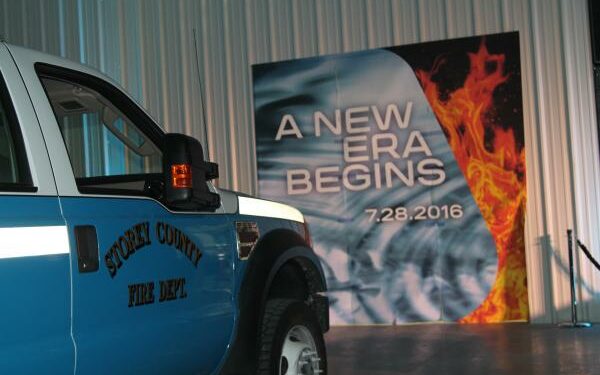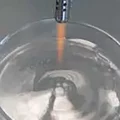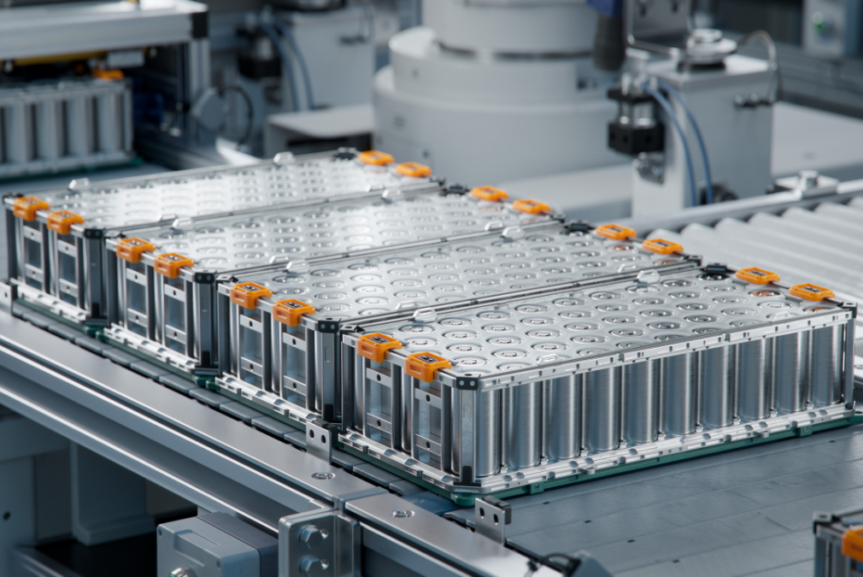A Storey County fire truck drives through a banner reading: ‘A new era begins 7.28.2016’. This is an opening as different to a traditional ‘ribbon cutting’ as the company’s technology is to customary battery recycling methods; the beginning of a new era of lead-acid battery recycling is here. Soon the first batteries will arrive to be recycled using a process that promises to revolutionise the battery recycling industry.
An hour before the dramatics of the official opening began, this writer was driving through Tahoe Industrial Park to Aqua Metals’ new plant. Apart from the odd wild horse wandering lazily along the rail tracks, there wasn’t much to excite this wary traveller. It only made the impact of seeing the 138,000 square foot AquaRefinary plant rise from the barren, sun scorched landscape like a huge, silver zeppelin from the surrounding mountains even more pronounced.
I was one of around 200 friends, family, and industry guests gathered for the grand opening ceremony in what will soon be the plant’s battery holding area. We were attending an opening event that included a guided factory tour, BBQ and an all-girl Led Zeppelin cover band— well almost, the Zepparella’s lead guitarist’s plane was cancelled and Rob, the brother of Steve Clarke, the firm’s chief executive officer, had been hauled out of retirement after more than a decade to make sure the show went on.
You may be thinking, what was all the fuss about? Well, as Clarke said during his opening speech, despite all the industry hype involving lithium-ion, and he referenced Tesla’s Gigagfactory opening just a few miles from the Aqua Metals’ plant, there was still an ‘800 pound gorilla in the room’ that was lead-acid.
“We are going into an era of battery energy storage,” Clarke said. “It’s the only 100% recycled product on the planet. Nothing else comes close, so we thought that was really cool.
“Then we looked at how lead-acid batteries were recycled and there’s an issue, and that’s smelting. A lot of people are trying to make it better, but outside the US it’s still poorly regulated.”
It’s hard to smelt and not make a mess or it costing a lot of money— just look at the ’emerging’ battery using countries. So the team at Aqua Metals started with a white board and soon realised they had three main goals. “We knew our process had to be cheaper, fundamentally cheaper, have zero emissions and be widely adoptable,” said Clarke.
“We wanted a business model that was viable and with an alternative to smelting and that’s what we think we’ve done.”
It seems a short 340 days since the company first broke ground on the world’s first ‘green’ lead-acid recycling plant‑ a plant the company hopes will revolutionise the commercial lead-acid battery recycling industry by replacing conventional smelting with a water-based alternative.
AquaRefining™ technology replaces everything in conventional smelting with a ‘green’ alternative— in fact the only part of the standard process will be the hammer mill in the battery breaking process.
The technique involves electrowinning, requires 30% less energy than smelting, produces no toxic waste and uses scalable electrochemical modules. The process is a closed-loop, room temperature, water-based recycling method that recovers 50% alloy and 50% lead from spent batteries.
More importantly it doesn’t produce any ‘toxic’ waste; so none of the by-products produced in current methods of smelting lead-acid batteries such as slag, dross, lead dust or sulphur dioxide. What it will produce, the company claims, is re-usable plastic chips, sulphuric acid for re-use, small quantities of copper, bismuth, and other alloy elements, irrigation water, and small quantities of silica and fibreglass waste.
Moving the goalposts for what is possible
Traditional smelters have to be huge to be cost effective, and because of this tend to be situated outside the western world. This is because loop-holes in the Basel Agreement means lead-acid smelters are mainly contained to Asia, and specifically the Philippines and China, because similar plants in Europe and the US have proven to be no longer cost effective.
Aqua Metals is hoping its AquaRefinery will be just the game-changer the lead-acid recycling industry needs after at least 30 years of increasingly bad PR (more of this later).
The company plans to produce 80 tonnes of secondary lead a day (tpd) at the plant, half of which is ultra pure lead, said Clarke, adding it’s purer than that taken out of mines. That amount is predicted to rise to 140 tonnes a day once the plant is in full flow sometime around 2018.
This goal will be helped following a deal with fellow TRIC residents Interstate Batteries. The North American replacement battery maker will supply around 1,474 tonnes of automotive and other lead-acid scrap batteries a month as feedstock, on top of making a strategic investment of around $10million into Aqua Metals.
Incidently, the company has also partnered with US machine makers Wirtz Manufacturing, which will produce the battery breaking system.
To achieve their 80tpd target Aqua Metals has made the AquaRefining process modular, making it possible to start lead production at a much smaller scale than is possible with traditional smelters.
Being modular also reduces the investment risk associated with building a conventional smelter-based lead production facility, and allows for better logistics, economics and a reduced carbon footprint.
Each module, essentially an electrolyser, is capable of producing two and a half tonnes of ultra-pure lead a day, and has been fully developed and validated, with the US Department of Agriculture (USDA) evaluating the technology as part of its Loan Guarantee Program. Others, of course, have undertaken detailed validation under non-disclosure agreements, which means the company cannot reveal their names.
Clarke said there is no upper limit to the size of individual plants, which could make it commercially economic at a much smaller scale than smelting can be. Good news for the ‘back-street’ recyclers in the emerging countries, especially those ’emerging’ industries in Mexico, and numerous countries in Africa and Asia, that have environmental issues exported to them via western countries.
In fact Clarke says rolling out the technology to emerging countries where pollution issue around lead-acid battery recycling are a real and present concern was a core objective right from the start.
He said: “We are demonstrating that there is a less expensive and cleaner alternative to smelting. With a commercial alternative to smelting, the lead-acid battery industry can take its rightful place as the leader in cost effective and sustainable battery technologies.”
So far so green, but to bolster their environmental credentials further the company is also hoping to qualify the AquaRefining modules and facility for future ISO14000 environmental management standards certification. This is because the company believes global lead-acid battery users will one day require ISO14000 certification, and the firm believes traditional smelters will be unlikely to achieve that certification.
How soon is now: PR storm hits lead industry
The opening of the AquaRefinery could not have come sooner as legislation tightens and lead’s reputation continues to be hit from all angles. Back in May BEST reported how the lead industry in North America was facing some of the biggest threats to its existence as a perfect storm of extremely bad news and regulatory challenges comes to a climax.
The story, which began with the Flint, Michigan lead-in-drinking water scandal, has culminated in a manifesto promise from Hilary Clinton to ‘ban lead usage within five years’.
Firms such as Exide Technologies— its now closed Vernon plant is in the middle of a state-funded $176.6 million environmental testing and clean-up work— and more recently Quemetco having to partially close its plant after failing to deliver on reparative measures.
In fact the US no longer has a primary smelter anywhere in the country after Doe Run closed its plant in 2013 after 27 years as part of a $65 million agreement with the US Environmental Protection Agency and the state of Missouri.
It’s these stories that led environmental lawyer David Weinberg, legal advisor to Battery Council International, to claim the PR storm is ‘probably the worst’ he has seen in his 30-year relationship with the industry body.
That PR storm is the back-drop for lead being a ‘possible candidate’ as a priority chemical target for tighter environmental standards as amendments to California’s 1976 Toxic Substances Control Act are implemented over the next several years through the Lautenberg Act. Weinberg also cites a pending bill in California, which would implement a 75% tax on the payments a lead-battery retailer received for returning used batteries to the manufacturer.
Could Aqua Metals new ‘green’ recycling method help stop stricter environmental standards being implemented on the lead-acid recycling industry.
Weinberg doesn’t believe so. “They just need to be reasonable, evenhanded and founded on principles of sound science and economic feasibility,” he says. “The industry needs to continue to make sure regulators understand the progress that has been made, and continues to be made, with regard to lead battery production and recycling, and why lead batteries are a key part of the solution to global climate change concerns.”
These challenges in educating a new set of policy makers will be put to the test in November when the US chooses its next presidential administration, be it Clinton or Donald Trump.
Weinberg adds, “The challenge to the lead battery industry, as to all industries that use chemicals but are not chemical producers, is to assure that the implementing regulations are reasonable and the prioritisation focuses on chemicals that merit additional attention, not materials that are already as thoroughly studied and regulated as use of lead by battery manufacturers and recyclers.”
AquaRefinery is certainly a step on the path to the industry shaking of lead’s ‘polluting’ reputation, but it will take a long time says Weinberg. Maybe even a whole generation before the industry regains the trust of legislators, politicians and the public.
The start of a revolution
For those readers who have not heard about Aqua Metals here is a potted history. Back in 2013 Clarke realised lithium was kicking lead-acid batteries on environmental issues because the lead industry was always making a mess. “The manufacturing process is good but the lead industry’s reputation as a whole is destroyed by non-compliant smelters outside the US,” stated Clarke.
With stories of companies in Europe and the US exporting lead mess to third world countries Clarke knew there had to be an alternative to smelting.
So rather than take the fight to the lithium industry (which was more than happy to push the ‘lead is dirty’ PR line) Clarke, Selwyn Mould (Chief Operating officer) and Thomas Murphy (Chief Financial Officer) founded Aqua Metals with the aim of developing advanced batteries and related technologies.
It took around four years from the idea to the plant opening. Between those points, the company has appointed Steve Cotton as Chief Commercial Officer. In March 2015 it bought 12.5 acres of land on the TRIC estate where the AquaRefinery stands, emerged from a quiet period in July of that year and by September had established its global headquarters in Alameda, California, US.
From these solid foundations the company will ‘quite likely’ go on to build more of its own facilities, and work with battery companies and metal companies on Joint Venture licence deals in North America and Europe and franchise the technology to other places in the world.
And why not, after all the lead industry is worth an estimated US$22billion. Nearly all of the 1.14 million tons of secondary lead produced in 2012 was recovered from old (post-consumer) scrap— and that number is rising each year. In 2015 it is predicted that lead production will top 13 million tonnes, of which metal from recycling makes up around a third of the total. It all means the future looks ‘Green’ for Aqua Metals.
So with all this development in such a short amount of time it’s easy to see why Clarke said there were too many enjoyable points during the process to date to choose a favourite. When BEST pushed him a little harder for some highlights, he said: “Watching the first prototype produce lead at the first attempt; closing our first $6million funding; watching the look on John Wirtz’ face when he first saw the prototype running; closing our IPO; breaking ground at TRIC a couple of weeks later; closing the USDA backed loan; signing the Strategic Relationship with Interstate; shipping our first modules; walking into the built out facility.
“Each one has been and incredible experience. But the thing I’m most proud of is the team we have built, the product we developed and the relationships we have built.”
The Bigger Picture
The opening of the Aqua Metals’ AquaRefinery could not have come at a more critical time as legislation tightens and lead’s reputation as the battery industry’s bogeyman continues apace.
There is no doubt the lead industry, especially in North America, is facing some of the biggest threats to its existence in its long history, as a perfect storm of extremely bad news and regulatory challenges start to take hold.
The story, which began with the Flint, Michigan lead-in-drinking water scandal, has culminated in a manifesto promise from US presidential hopeful Hilary Clinton to ‘ban lead usage within five years’.
While environmental lawyer David Weinberg, legal advisor to Battery Council International, might appear unfazed by the Clinton threat, the Californian challenge has all the hallmarks of a political quagmire.
One which could cost the lead industry yet more money in as yet uncosted and potentially unquantifiable costs, taking on so-called “Superfund” dimensions— making the whole north American lead-acid industry responsible for clean-up programme at a number of lead-smelters.
Smelters pay ultimate price for failure
In recent years firms such as Exide Technologies have paid the ultimate price for lax compliance of environmental regulations. It was forced to close its Vernon plant in 2015 after failing to reverse the beleaguered plants fortunes— including reducing toxic emission of lead and arsenic by 15% in 2013 (Exide had hit an 30-day average reading of 0.17 mg/m3).
The plant is now in the middle of state-funded $176.6 million environmental testing and clean-up work. The work will include the testing of residential properties, schools, day care centres and parks within a 1.7-mile radius of the plant, and fund cleaning of as many as 2,500 properties with the highest lead levels.
But lobbyists are already demanding testing and clean-up over a wider area, which could push costs up to US$500milion and maybe more.
More recently Quemetco had to partially close its plant after failing to deliver on reparative measures. This just a year after the company, a subsidiary of private secondary lead smelting firm RSR Corporation, sought to increase production in a bid to improve operational efficiency at its lead-acid battery recycling facility in City of Industry, California.
The California Department of Toxic Substances Control (DTSC) made the decision because it deemed Quemetco had failed to take corrective action on previously cited violations.
The Los Angeles County Department of Public Health (Public Health) is closely monitoring the situation and working with the State, who is the lead regulatory authority, and local partners to address potential health impacts.
“The enforcement action taken by DTSC demonstrates that the Quemetco facility continues to operate in non-compliance with regulations,” said State Supervisor Don Knabe.
“Quemetco must act responsibly and operate in a manner which protects its workers, neighboring residents and the environment, now and in the long-term.”
It all leads to a bleak landscape for the lead-smelting industry in the US. A multi-billion dollar battery market which has not had a primary smelter anywhere in the country since 2013, after Doe Run closed its plant as part of a $65 million agreement with the US Environmental Protection Agency and the state of Missouri.
Pollution a global issue
One of Aqua Metals’ key propositions is that its AquaRefinary modules are small and scalable. It means the technology can be shipped to the so-called ’emerging’ countries where emissions are a major issue, especially in small-scale recycling set-ups.
A report from The Lead Recycling Africa Project, found lead poisoning was severely under-reported in sub-Saharan Africa, where 800,000 tonnes (8% of annual world production) is made available each year for recycling.
Issues arise from inadequate monitoring of battery repair shops, small-scale collectors and the manual breaking of more than 1.2 million tonnes of used lead-acid batteries in Africa each year.
The report said: “Management of end-of-life batteries in developing countries and emerging economies is often inadequate and presents a severe health risk to workers and neighbouring communities.”
The Lead Recycling Africa Project is calling on governments, regulatory bodies and the industry to help clean up the problem.
Meanwhile a staggering 70% of Indonesia’s 300,000 batteries that were processed in 2010 where performed by informal small-scale smelters.
In 2015 Budi Susilorini, the Indonesia Country Coordinator at not-for-profit health and environment organisation Blacksmith Institute told the 4th International Lead Recycling conference “the battery should go back to the producer”.
Susilorini told BEST: “Used lead-acid batteries in Indonesia are processed by informal small scale smelters, and we want no more batteries going to informal smelters.”
The Blacksmith Institute may be unsure whether its legal or illegal smelters causing pollution in the area surrounding the country’s 300 plants, but it’s in no doubt that Indonesia must tighten regulations to minimise health risks surrounding used lead–acid batteries (ULAB) recycling plants.
In 2009, a collaborative project between the Blacksmith Institute and Komite Penghapusan Bensin Bertimbel set out to mitigate lead impacts from ULAB recycling.
Regaining trust a life-time away
It is against this backdrop of information that led Weinberg to claim the lead-acid battery PR storm is ‘probably the worst’ he has seen in his 30-year relationship with the industry.
That PR storm could make lead a ‘possible candidate’ as a priority chemical target for tighter environmental standards as amendments to California’s 1976 Toxic Substances Control Act are implemented over the next several years through the Lautenberg Act.
Weinberg also cites a pending bill in California, which would implement a 75% tax on the payments a lead-battery retailer received for returning used batteries to the manufacturer.
Could Aqua Metals new ‘green’ recycling method help stop stricter environmental standards being implemented on the lead-acid recycling industry?
Weinberg doesn’t believe so. “They just need to be reasonable, evenhanded and founded on principles of sound science and economic feasibility.”
He added: “The industry needs to continue to make sure regulators understand the progress that has been made, and continues to be made, with regard to lead battery production and recycling, and why lead batteries are a key part of the solution to global climate change concerns.”
These challenges in educating a new set of policy makers will be put to the test in November when the US chooses its next presidential administration, be it Clinton or Trump.
Weinberg said: “The challenge to the lead battery industry, as to all industries that use chemicals but are not chemical producers, is to assure that the implementing regulations are reasonable and the prioritisation focuses on chemicals that merit additional attention, not materials that are already as thoroughly studied and regulated as use of lead by battery manufacturers and recyclers.”
AquaRefinery is certainly a step on the path to the industry shaking of lead’s ‘polluting’ reputation, but it will take a long time says Weinberg. Maybe even a whole generation before the industry regains the trust of legislators, politicians and the public.












